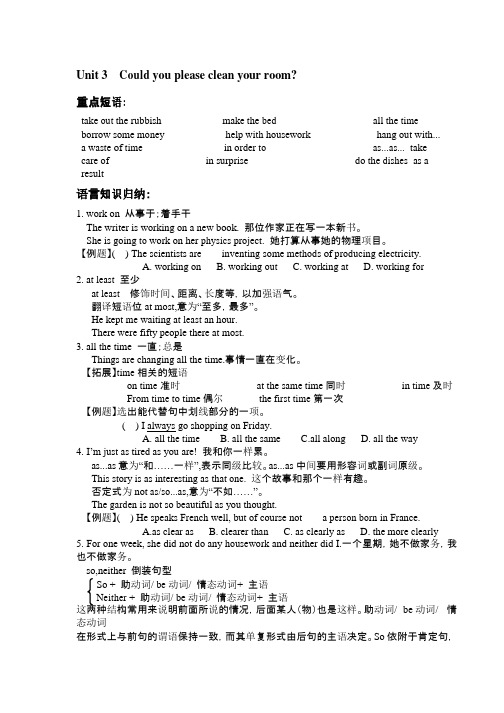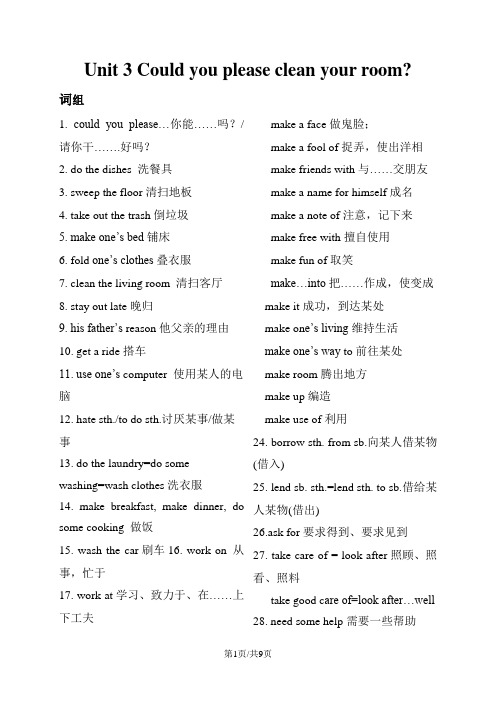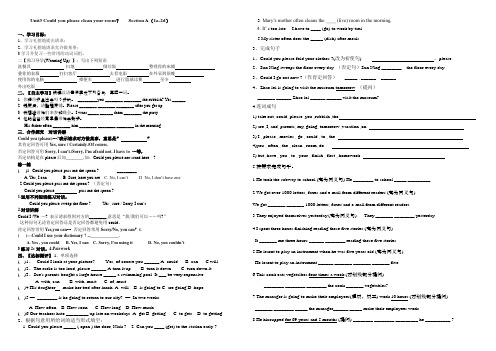unit3could you please clean your room你能打扫一下你的房间吗?
- 格式:doc
- 大小:23.50 KB
- 文档页数:2

Unit 3 Could you please clean your room?词1. could you please ⋯你能⋯⋯? /你干⋯⋯.好?2.do the dishes 洗餐具3.sweep the floor 清地板4.take out the trash倒垃圾5.make one ’ s bed床6.fold one’s clothes叠衣服7.clean the living room 清客8.stay out late晚9.his father reason’他父的原因10.get a ride搭e one computer’s使用某人的12.hate sth./to do sth. 某事 /做某事13.do the laundry=do some washing=wash clothes洗衣服14.make breakfast, make dinner, do some cooking 做15.wash the car 刷 16. work on 从事,忙于17.work at 学、致力于、在⋯⋯上下时间make a face做鬼;make a fool of 愚弄,使出洋相make friends with 与⋯⋯交朋友make a name for himself成名make a note of注意,下来make free with 私自使用 makefun of 讥笑make⋯ into 把⋯⋯作成,使成make it 成功,抵达某make one’s living持生活make one ’ s wayto 前去某make room 出地方make up 造make use of利用24. borrow sth. from sb.向某人借某物(借入 )25.lend sb. sth.=lend sth. to sb借.某人某物 (借出 )26.ask for 要求获得、要求到27.take care of = look after 照、照看、照顾take good care of=look after⋯well 28. need some help需要一些帮助第1页/共9页18. borrow some money借一些钱29. come over过来19. invite sb. to do sth 邀请某人做某30. get angry生气事31. have a test考试20. go to the store去商铺32. make a clean sweep of 完全打扫21.agree sb. to do sth同.意某人做某事22.agree with sb. =agree with whatone says赞同某人的建议23.(需认识)make a deal作成交易知识重点1. ---Could you please take out the trash ?你能把垃圾倒掉吗?--- sure . 自然能够。


人教新目标版英语八下Unit 3《Could you please clean your room》说课稿1一. 教材分析人教新目标版英语八下Unit 3的主题是“Could you please clean your room?”,主要讨论了如何请求别人做事以及如何表达感谢和道歉。
本节课的主要语言点包括情态动词could的用法,一般现在时的表达方式,以及一些日常生活中的交际用语。
通过学习本节课,学生能够更好地理解和运用情态动词和一般现在时,提高他们的口语交际能力。
二. 学情分析在进入八年级下学期,学生已经对人教新目标版英语有了初步的了解和掌握,具备一定的英语基础。
他们对于情态动词和一般现在时的概念已经有所了解,但在实际运用中还存在一定的困难。
此外,学生在口语交际方面还存在一定的障碍,需要通过大量的练习来提高。
三. 说教学目标1.知识目标:通过学习本节课,学生能够掌握情态动词could的用法,理解一般现在时的表达方式,并能够运用所学知识进行简单的口语交际。
2.能力目标:学生能够流利地朗读和背诵课文,提高他们的口语表达能力。
3.情感目标:通过学习本节课,学生能够培养良好的生活习惯,学会尊重和理解他人。
四. 说教学重难点1.重点:情态动词could的用法,一般现在时的表达方式。
2.难点:一般现在时的运用,特别是在实际交际中的运用。
五. 说教学方法与手段在本节课的教学中,我将采用任务型教学法,通过设置各种任务让学生在实际操作中学习和运用英语。
同时,我会运用多媒体教学手段,如课件、视频等,来增加课堂的趣味性和互动性。
六. 说教学过程1.导入:通过提问学生日常生活中请求别人做事的经历,激发学生的兴趣,引入本节课的主题。
2.呈现:通过课件展示课文内容,让学生初步感知和理解情态动词could和一般现在时的用法。
3.操练:通过小组活动和角色扮演,让学生在实际交际中运用所学知识。
4.扩展:通过设置任务,让学生在实际操作中进一步运用和巩固所学知识。

Unit3 Could you please clean your room?重点短语:take out the rubbish make the bed all the time borrow some money help with housework hang out with...a waste of time in order to as...as...take care of in surprise do the dishes as a result语言知识归纳:1. work on 从事于;着手干The writer is working on a new book.那位作家正在写一本新书。
She is going to work on her physics project. 她打算从事她的物理项目。
【例题】( ) The scientists are____inventing some methods of producing electricity.A. working onB. working outC. working atD. working for2. at least至少at least修饰时间、距离、长度等,以加强语气。
翻译短语位at most,意为“至多,最多”。
He kept me waiting at least an hour.There were fifty people there at most.3. all the time 一直;总是Things are changing all the time.事情一直在变化。
【拓展】time相关的短语on time准时From time to time 偶尔at the same time 同时the first time第一次in time及时【例题】选出能代替句中划线部分的一项。
( ) I always go shopping on Friday.A. all the timeB.all the sameC.all alongD.all the way4. I’m just as tired as you are! 我和你一样累。

Unit 3 Could you please clean your room? 词组1. could you please…你能……吗?/请你干…….好吗?2. do the dishes 洗餐具3. sweep the floor清扫地板4. take out the trash倒垃圾5. make one’s bed铺床6. fold one’s clothes叠衣服7. clean the living room 清扫客厅8. stay out late晚归9. his father’s reason他父亲的理由10. get a ride搭车11. use one’s computer 使用某人的电脑12. hate sth./to do sth.讨厌某事/做某事13. do the laundry=do somewashing=wash clothes洗衣服14. make breakfast, make dinner, do some cooking 做饭15. wash the car刷车16. work on 从事,忙于17. work at学习、致力于、在……上下工夫make a face做鬼脸;make a fool of捉弄,使出洋相make friends with与……交朋友make a name for himself成名make a note of注意,记下来make free with擅自使用make fun of取笑make…into把……作成,使变成make it成功,到达某处make on e’s living维持生活make one’s way to前往某处make room腾出地方make up编造make use of利用24. borrow sth. from sb.向某人借某物(借入)25. lend sb. sth.=lend sth. to sb.借给某人某物(借出)26.ask for要求得到、要求见到27. take care of = look after照顾、照看、照料take good c are of=look after…well 28. need some help需要一些帮助18. borrow some money借一些钱19. invite sb. to do sth邀请某人做某事20. go to the store去商店21.agree sb. to do sth.同意某人做某事22. agree with sb. =agree with what one says同意某人的意见23.(需了解)make a deal作成交易29. come over过来30. get angry生气31. have a test考试32. make a clean sweep of 彻底扫除知识要点1.---Could you please take out the trash ? 你能把垃圾倒掉吗?--- sure . 当然可以。

Unit3 Could you please clean your room?Section A(1a-2d)一、学习目标:1、学习礼貌地提出请求;2、学习礼貌地请求允许做某事;3学习并复习一些常用的动词词组。
二【预习导学(Warming Up) 】:写出下列短语洗餐具扫地倒垃圾整理你的床铺叠你的衣服打扫客厅去看电影在外呆到很晚使用你的电脑搭便车进行篮球比赛至少外出吃饭二、【自主学习】根据汉语意思完成下列各句,每空一词。
1. 你把垃圾拿出去吗?好的。
_________you ________ ________ the rubbish? Yes,______2. 起床后,请整理床铺。
Please ________ ________ ________ after you get up.3. 我想邀请他们来参加晚会。
I want _____ ______ them ________ the party.4. 他的爸爸经常早晨带他去散步。
His father often ________ him ________ ________ ________ in the morning.三.合作探究对话讲解Could you (please)…?表示请求对方做某事,意思是””其肯定回答可用Yes, sure / Certainly./Of course.否定回答可用Sorry, I can’t./Sorry, I’m afraid not. I have to …等,否定结构是在please后加________.如:Could you please not stand here ?练一练( )1--Could you please pass me the spoon ? --_________.A. Yes, I can.B. Sure, here you areC. No, I can’t D .No, I don’t have one2.Could you please pass me the spoon ? (否定句)Could you please pass me the spoon ?1.运用不同短语练习对话。
Unit 3 Could you please clean your room?1.小明放学后非要帮妈妈做家务,妈妈说你不会干,别捣乱,一边玩去,小明还是坚持要帮忙,说是老师给布置的任务,妈妈说:你们老师屁事真多!第二天,小明把帮妈妈做家务整个过程的日记交给了老师。
2.我曾经尝试过做饭,但每次我都会把厨房变成一个烟雾缭绕的战场。
现在,我确信我的厨艺唯一能做的就是制作烟雾报警器。
3. 有一次,我决定自己洗衣服。
不幸的是,我把红袜子和白衬衫放在了一起。
结果,我得到了一件粉色的衬衫和一堆淡红色的袜子。
看来我在洗衣方面的创新精神比我想象的要强。
4. 老婆总是说我不会做家务。
有一天她不在家,我决定展示一下我的能力。
我打扫了整个房子,甚至把家具都重新布置了。
当老婆回到家时,她看着我,然后说:“你确定你是打扫了,而不是把家里翻了个底朝天?”5. 我试图拖地,但每次拖把都会比我先累。
我猜它可能是在抗议我让它做的太多工作。
6. 我尝试做饭,打开食谱应用程序,发现需要10分钟准备,50分钟烹饪。
到现在我已经花了45分钟在决定做什么菜。
7. 我发现了一种新的家务活动——找东西。
我妻子总是让我找她的钥匙、手机或其他东西。
我想我应该把这个加到我的简历上,我现在是一名专业的“失物搜寻者”。
8. 我妻子总是抱怨我不帮忙做家务。
但我认为我在精神支持方面做得很好——我总是鼓励她去看那些家务做得很好的电视节目。
拓展阅读(一)There are certain things you never imagine yourself saying.“I just got a worm in my eye!” is one of them.And yet I did say it—I screamed it, actually.The family was all here and we were in the garden, when I saw a worm nearby. I asked my six-year-old grandson to come over and remove the worm. He picked up the worm, studied it quickly and then threw it into the air.The worm quickly fell back to earth, landing on my face against my left eyelid. That’s when the screaming started and the jumping up and down.You know how they say when you meet a small creature, that the small creature is just as afraid of you as youare of it? They lie.The worm showed no fear. I, however, am still having nightmares about the experience, which was several days ago.The most important thing in all this is that my grandson said he was sorry to me.I’d just been reading a book that makes a connection between adults doing the slow and hard work of teaching manners to children and greater levels of civility in society.Table manners, language manners and even manners in dress all show levels of self-control.Having self-control limits what we say and how we behave, making many of us appear a good deal better than we really are.Good manners also have the possibility to make mealtime a pleasant experience, even with small children.All of my grandchildren, except the ones that can’t yet talk, ask to be excused before leaving the table.It is a sign of respect for others at the table and a sign of respect for the meal itself. It’s also more pleasant than pushing one’s chair back and running for the back yard.Those tall enough, and even those not tall enough, also take their dishes to the kitchen.Manners are what civilize us—around our tables, in our families, homes and our communities.So when a little boy has the courage to apologize to a grandma who is screaming and jumping up and down, at least we know that our years of teaching young people manners are paying off—one worm at a time. 1.Where were they when the author saw a worm?A.In the house.B.In the garden.C.In the park.D.In the back yard.2.The worm fell down on the author’s________.A.leg B.head C.left eyelid D.right eyelid3.What does the underlined word “nightmares” mean?A.好运B.噩梦C.回忆D.愿望4.The author believed that his grandson’s apology is________.A.a good manner B.a bad behavior C.unnecessary D.a must5.What does the passage tell us?A.The importance of apology.B.The importance of good manners.C.Many kinds of good manners.D.A story of a worm.【答案】1.B 2.C 3.B 4.A 5.B【导语】本文主要以作者与其孙子的故事来讲述礼仪的重要性。
Unit3 Could you please clean your room?2dA 托尼,你可以帮这做几件事吗?B 我至少看完这个节目行么?A 不行,我认为两个小时的电视对你来说足够了!B 好的,你要我做什么A 你倒垃圾、叠衣服和洗餐具好吗?B 那么多?A 是的,因为妈妈随时都会买完东西回来。
如果他看到这样不整洁,她会不高兴的。
B 但这房子已经相当干净和整洁了!A 是的,它是干净的,但它不是“妈妈(要求的)干净”3a 上个月,当我放学回到家时,我们的狗迎接我。
他想要散步,但我太累了。
我扔下我的书包就去起居室了。
我刚在电视机前坐下,我妈妈就过来了。
“你把狗带出去溜溜好吗?”她问。
“我能先看完这个节目吗?”我问。
“不行!”她生气的回答道。
“你总是看电视,在家里从不帮忙!我不能整天工作,整晚还做家务。
”“哦,我在学校也整天学习!我和你一样累!”我大喊回应到。
我妈妈没说什么就走了。
一个星期她也没做家务,我也没有做。
最后,我找不到一个干净的盘子,也找不到一件干净的衬衫。
接下来的第二天,我妈妈下班回家发现房子既干净又整洁。
“发生了什么事?”她惊讶地问。
“对不起,妈妈。
我终于懂得,我们需要分担家务活来拥有一个干净而舒适的家。
”我答道。
2b 《星期日邮报》杂志邀请父母亲写点关于他们是否认为年轻人应该在家里做杂务的情况。
亲爱的先生:我不理解为什么一些父母让他们的孩子在家里帮着做家务活和杂务。
如今,孩子们已经有来自学校的总够的压力了。
他们也没有时间学习和做家务活。
家务活浪费他们的时间。
我们只让他们做学生分内的事好吗?为了取得好成绩,进入一所好的大学,他们应当把时间花在学业上。
当他们长大了的时候,他们也将不得不做家务活,因此,他们现在没有必要做家务。
给孩子们在家里提供一个干净而又舒适的环境是父母的责任。
而且我认为做杂务不是那么难。
我不介意做。
史密斯先生亲爱的先生:我认为孩子们学会怎么样做杂务和帮助父母亲做家务活是重要的。
八年级英语下册《Unit 3 What were you doing when
the UFO arrived?》说课稿
一.教材分析:
1. 位置和内容:这是新目标英语(Go For It)八年级下册第三单元
第一课时。
谈论如何使用过去进行时。
如何使用过去进行时是本单元的重点内容。
为了让学生更好的认识过去进行时,我重新安排了教学内容:SectionA(1a、1b、1c). 把这些内容组合在一起。
同时我也创造了一些便于进行沟通交流的情境,让学生学会使用过去进行时。
2.教学重点: 如何使用过去进行时。
3.教学难点: 如何在由when引导的时间状语使用过去进行时。
二、教学目标:
1. 知识目标:要求学生掌握使用过去进行时。
2. 能力目标:让学生做课堂的主人,同时培养他们掌握一些行之
有效的学习方法,优化学习效果。
3. 情感目标:让学生爱上英语课堂活动,鼓励他们在课堂上进行
合作交流。
4.学习策略目标:设法使学生掌握使用英语进行交流,学习积极
参与班级活动.
三、教学分析:
1. 说教法:
1)任务型教学法:给学生三项任务,让学生使用过去进行时来完
成这些任务。
使他们在任务中学习英语。
2)情景教学法:创造足够的交际环境刺激学生的视听能力,使他们
能够更好的理解这一时态。
以培养他们的听和会话能力。
3)交际教学法:学生可以通过俩俩对话或小组对话来掌握过去进
行时。
2. 说学法:
1)学生要善于把握机会,用英语进行沟通,大胆实践。
2)积极参加课堂活动,培养合作关系。
四.学生分析:
学生七年级下册就学过现在进行时, 并掌握如何使用现在进行时来描述日常活动, 而且掌握了一些日常活动的短语, 有利于他们学习过去进行时.
五. 教学过程的分析:
步骤1---组织
1)师生互相打招呼;
2)唱英文歌曲;
步骤2---复习(目的是复习现在进行时)
1)显示三幅画面在屏幕(一学生在弹吉它,一学生在打蓝球,一些人在聚会,一人在玩电脑). 问:他们在做什么?
2. 引导学生到实际情况中;问一男学生:请问你在做什么? 学生可能回答:我在听你说话。
告诉全班同学:他在听我说话。
和另一个女生重复操练这一个句型,然后尝试用现在进行时和全班一起操练不同的人称。
3.学生使用现在进行时进行小组对话。
步骤3---引入:给学生介绍过去进行时
让学生看关于UFO的图片,引出句型“What were you doing when the UFO arrived? Where were you when the UFO arrived?
3.预习新单词和短语,看图片插入句型“What was he/she doing when the UFO arrive
4 比较: 过去进行时与现在进行时。
(作比较可以让学生有深刻的印象)
时态现在进行时过去进行时
用法表示现在正在进行的动作表示过去某个时刻正在进行的动作
结构 is/am/are + doing was/were + doing
例句 I am having an English class I was having an English class.步骤4---教授新课: SectionA(1a、1b、)
1.屏幕上展示照片 (图18页)。
给学生介绍图片相关的情况。
2.让学生通过听力了解图片中发生的相关事情。
(这一步骤是为了使学生了解课文,并且帮助学生能轻易完成下面的任务1)
步骤5---三个任务:
任务1:谈论当飞碟到达的时候人们在做什么. 为了让工作更容易做,教师点着图中的剪头发的人问: 当飞碟到达的时候他在做什么。
重复这一指令。
2. 学生小组操练上述的对话。
并让一些学生来展示他们的对话过程。
3.学生尝试把他们所讲的句子在练习本上写出来。
任务2:记忆比赛(让学生更加集中注意力在课堂上)
比赛是这样的:1. 展示十余张动画在屏幕上.动画按一定的时间先后出现。
2. 把全班同学分成三个小组. 如果学生知道答案,迅速起来回答,如果答案正确,那么他的团队能够取得10分。
步骤6--总结:在学生经过三个任务操练后,帮助他们总结过去进行时。
步骤7---作业:进行课后调查;
询问你的两个搭档昨天这个时候他们在做些什么. 下一节上课的时候做一个调查报告。
Blackboard Work
Unit 3 What were you doing when the UFO arrived?
I am writing on the blackboard.
I was writing on the blackboard. I am walking in the room.
I was walking in the room.
用法表示过去某个时刻正在进行的动作
结构 was/were + doing
常见的
标志词1) at 9 o’clock ye sterday.。